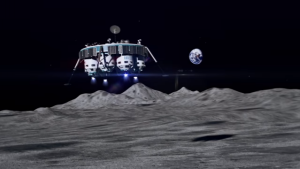Spaceflight company Moon Express has released its plans to mine the moon with robots and it aims to get started by 2020. The company was founded in 2010 with the aim of winning the Google Lunar Xprize — a competition to get privately funded spacecraft on the moon. And while it still has its sights on that prize, Moon Express has planned beyond that and has laid out a strategy for establishing its lunar outpost in just a few years.
The company’s first moon mission, dubbed Lunar Scout, will use Rocket Lab’s Electron rocket to send its MX-1E robotic explorer to land on and deliver several payloads — including the International Lunar Observatory — to the moon. If completed by the end of this year and before the four other finalists for the Lunar Xprize, this mission could win Moon Express the competition’s $20 million prize. Lunar Outpost, the second planned mission, will establish Moon Express’ commercial presence on the moon’s South Pole using its MX-2 system. Once set up, the robots will prospect for water and minerals. Finally, the third mission, Harvest Moon, will bring samples from the moon back to Earth and Moon Express hopes to complete this leg by 2020.
The MX-1E lander hasn’t yet been completed and Rocket Lab is still working on the Electron rocket, which has only flown once so far with two more test launches planned for this year. However, Moon Express does have coveted FAA clearance to land on the moon and it was the first private company to be granted such approval.
Mining for water and rocks on the moon has both commercial and research value. Water and ice at the lunar poles can be used as rocket propellant and Moon Express says on its website, “The discovery of water on the Moon is a game changer, not just for the economic viability of lunar resources, but for the economics of reaching Mars and other deep space destinations. Water is the oil of the solar system, and the Moon will become a gas station in the sky.” As for moon rocks, harvesting them and bringing them back to Earth could be a lucrative business for the company. As Ars Technica reports, NASA never sold any of its Apollo mission lunar haul, but three rocks from the Soviet moon mission weighing just 0.2 grams sold for $442,500 in 1993. Moon Express says its lunar samples will also be used to benefit science.
The plan is pretty ambitious and there’s still plenty Moon Express has to do before completing it or nabbing the Lunar Xprize championship, but we’re in for an exciting few years if the company can pull it off.
Ask me anything
Explore related questions





